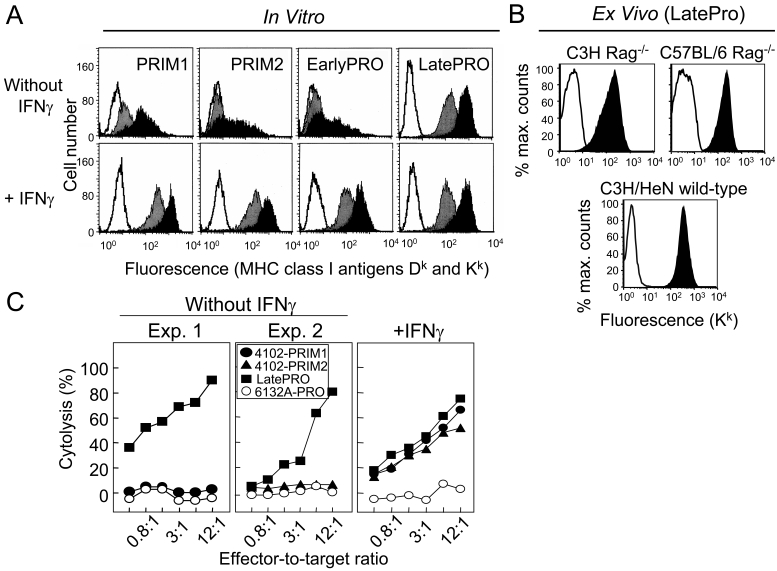Figure 5.
4102 primary cells express low constitutive levels of MHC I molecules and are resistant to cytolysis by tumor-specific CTLs. (A) Expression of MHC I molecules in vitro by 4102 cancer cells. Primary tumor cells grown in vitro were incubated with or without 100 U/ml recombinant IFNγ for 2 days. The cells were analyzed by flow cytometry after being incubated with supernatants from hybridomas specific for H-2Dk (grey) or H-2Kk (black) followed by goat anti-mouse Ig-FITC. Control cells were stained with only the second-step antibody (unshaded). (B). Expression of MHC I Kk molecules on LatePRO tumor cells in vivo. LatePRO tumor cells were isolated from growing tumors more than 14 days after inoculation and greater than or equal to 1 cm in diameter. Top panels: EGFP-transduced LatePRO tumor cells recovered from immunodeficient C3H Rag-2-/- mice and C57BL/6 Rag-1-/- mice. The tumor cells were identified as the EGFP-positive population. Bottom panel: Untransduced LatePRO tumor cells recovered from normal immunocompetent C3H mice. The tumor cells were identified as the CD45-negative population. 4102 tumor cell suspensions were directly stained with anti-Kk (black) or isotype control (unshaded) antibodies and analyzed for MHC I expression by ex vivo flow cytometry. (C) Primary 4102 tumor cells that express low levels of MHC I are resistant to cytolysis by tumor-specific CTLs unless first exposed to IFNγ. Tumor cells were incubated with or without 100 U/ml recombinant IFNγ for 2 days prior to use as 51Cr-labeled targets in a 4.5 h cytolysis assay. The CTL line was previously shown to recognize an unique tumor antigen expressed only on tumors of the 4102 lineage. Without IFNγ treatment, PRIM1 and PRIM2 were poorly lysed (left panel). However, after IFNγ treatment, these cell lines were lysed as effectively as LatePRO by the antigen-specific CTL (right panel), indicating the presence of the unique tumor antigen. 6132A-PRO is an independently generated UV-induced tumor that does not express the 4102 tumor-specific antigen.

